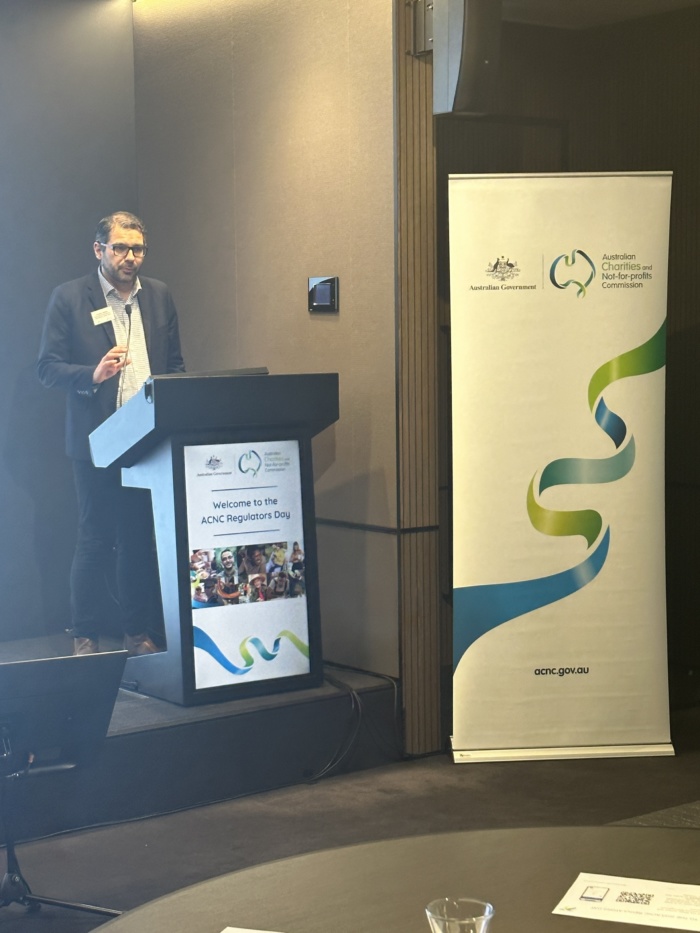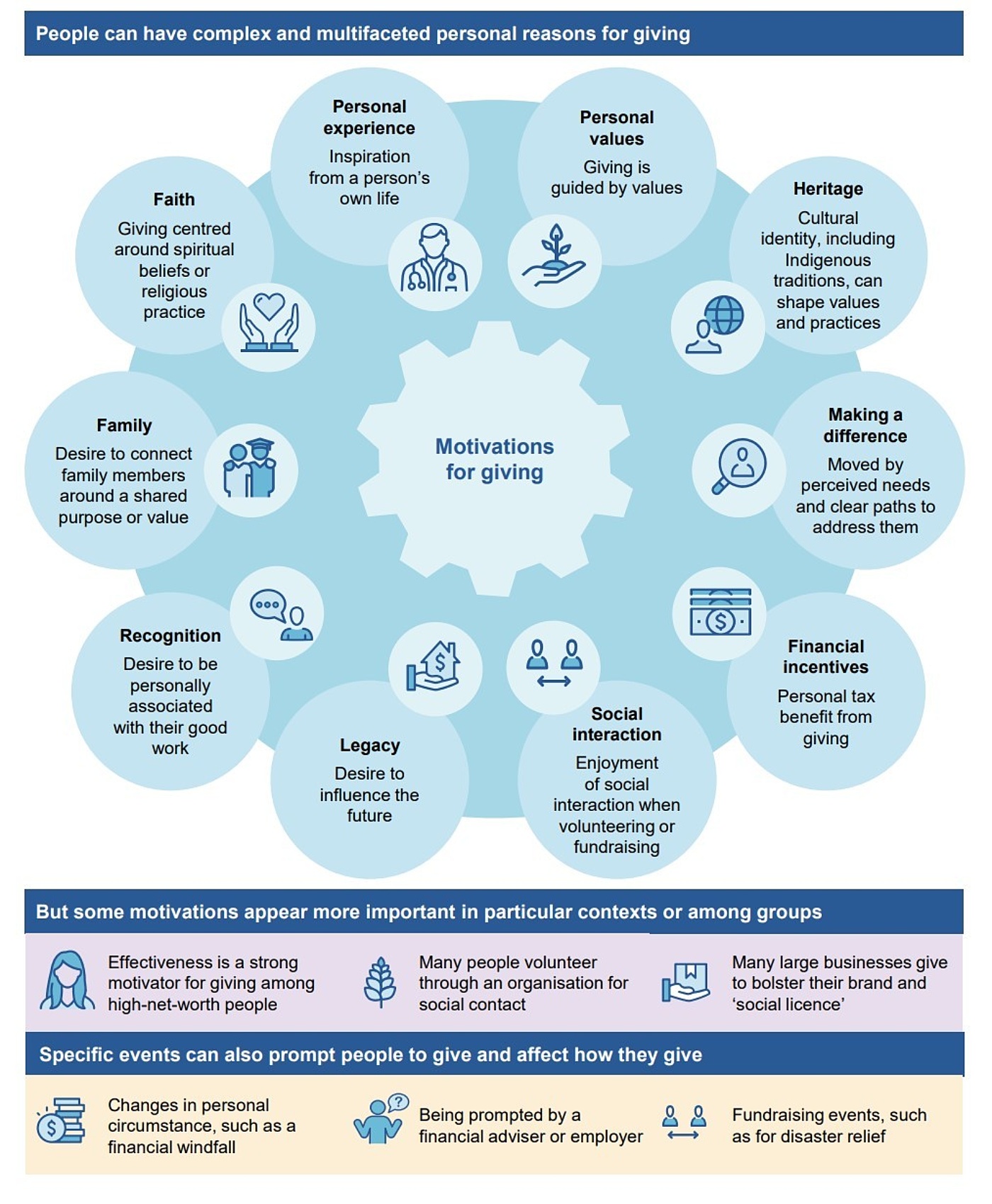
Attention governments: There’s more to giving out grants than handing over the money
Posted on 18 Feb 2026
Around 50 per cent of all funding for charities in Australia comes from government. The nature of…
Posted on 30 Nov 2023
By Greg Thom, journalist, Institute of Community Directors Australia

The Productivity Commission has recommended an overhaul of tax rules to give thousands more charities special tax status in a bid to boost donations.
Just released, the commission's 338-page draft report on philanthropy, Future Foundations for Giving, labelled the deductible gift recipient (DGR) system used to determine which charities are eligible for tax-deductible donations as "not fit for purpose".
“Tax incentives influence giving – but the DGR system is poorly designed, overly complex and excludes many causes without a coherent policy rationale,” said associate commissioner Krystian Seibert.
The proposed changes are among a raft of possible reforms aimed at boosting donations.
If adopted by the federal government, the reforms would boost the number of charities eligible for DGR status by 60% – from 25,000 to as many as 40,000.

The Productivity Commission inquiry analysed charitable giving trends and proposed recommendations in line with Canberra’s pledge to double philanthropic giving by 2030.
The report found that while the overall amount donated to charities has been increasing, fewer people are donating.
Key recommendations of the interim report include:
“Our draft recommendations would strengthen the foundations for philanthropy so that the benefits of giving can be realised into the future.”

Productivity Commission deputy chair Dr Alex Robson said Australia was a generous nation, donating more than $13 billion to charities in 2021, an increase of 26% in real terms since 2017.
If current trends continued, the commission estimated, the level of giving would rise by 7.9% to $26.5 billion by 2029–2030.
“Our draft recommendations would strengthen the foundations for philanthropy so that the benefits of giving can be realised into the future,” said Dr Robson.
The report was scathing, however, in its criticism of the DGR system and its detrimental impact on charities.
“Tax incentives influence giving – but the DGR system is poorly designed, overly complex and excludes many causes without a coherent policy rationale,” said Mr Seibert.
As an example, he said a charity preventing illnesses in children would fit the eligibility criteria for receiving tax-deductible donations, but a charity that tried to prevent injuries in children would not.
A charity with a general focus on social wellbeing could also miss out on tax breaks because its activities were too broad to be considered poverty relief.
“Distinctions like this defy common sense and community expectations – a clear sign that reform is needed,” said Mr Seibert.
The report found DGR donations by individuals were worth $4.4 billion in 2020–21 – a threefold increase in 20 years.

Attaining DGR status has become a contentious topic and was raised consistently throughout the inquiry.
The ACNC is currently embroiled in a court battle with LGBTIQ+ advocacy organisation Equality Australia, after rejecting its application to be classified under the Public Benevolent Institution (PBI) sub-category, which would allow it to claim tax deductible donations.
The Productivity Commission's draft report recommended simplifying the DGR system and introducing a new "principles based" assessment approach to determine DGR eligibility as a way of directing charitable support to where it is needed most.
Specific changes proposed included:
The commissioners said if adopted, the draft recommendations would mean that more charities overall would be able to access tax-deductible donations.
This could lead to new charities, the scaling up of existing ones, and more innovation to address social challenges and generate social capital.

Dr Robson said the report had proposed a simpler, fairer and more transparent process for determining which charities can receive tax-deductible donations.
“This is evidence-based tax reform that will support giving to a more diverse range of causes, refocusing the system toward activities that deliver broader community benefits,” he said.
While it took aim at the DGR system, the inquiry found the framework governing personal income tax deduction for donations did not need substantive reform.
“Preliminary estimates by the Commission show the personal income tax deduction is likely to be an effective mechanism for encouraging donations of money and other assets,” the report said.
“This is evidence-based tax reform that will support giving to a more diverse range of causes, refocusing the system toward activities that deliver broader community benefits.”
Dr Robson said setting up an Aboriginal and Torres Strait Islander philanthropic foundation would facilitate new collaborations between philanthropy and Indigenous communities, a process that was already under way.
The report found strengthening the capacity of Aboriginal and Torres Strait Islander organisations to access philanthropy could advance community empowerment and self-determination.
The report also recommended boosting the role of the ACNC.
“The regulatory and information-sharing role of the ACNC can be strengthened, including through enhanced collaboration and cooperation with state and territory regulators, so that Australians can continue to donate with confidence,” said commissioner Julie Abramson.
The report confirmed that while volunteering was widespread in Australia, with six million volunteers in 2022, the formal volunteering rate had declined over the past decade.
The commissioners said philanthropy, particularly volunteering, could help build social capital by contributing to social networks, building trust within communities, and diffusing knowledge and innovations through communities.
They also found philanthropy could provide untied, flexible or long-term funding for more innovative and riskier projects compared to what government funding could offer.

Community Council for Australia CEO David Crosbie welcomed the report, particularly the recommendations to overhaul the DGR system.
"There is no doubt that the current DGR system is ‘not fit for purpose’ and should be reformed,” said Mr Crosbie.
“Governments should not be in the business of picking winners and losers amongst charities, and yet that is what our current DGR system does.
“Bigger charities with money, political influence, and good legal teams can gain DGR while smaller, less powerful organisations doing the same work struggle to be eligible.”
Mr Crosbie also endorsed recommendations to strengthen the ACNC but warned against extending the regulator's role too far.

“Regulators work with their constituency and enhance trust with the public,” he said.
“Like governments, regulators should not be in the business of picking winners or losers.”
Mr Crosbie said the CCA had long argued there was scope to significantly expand the use of data collected by the ACNC through Annual Information Statements.
“We welcome this recommendation. Better analysing the sector can only be beneficial for policy making and planning into the future.”
Mr Crosbie said while he doubted most charities would have major concerns over the draft report, there were areas CCA would like to have seen given more prominence.
These included the introduction of inheritance taxes, living wills, superannuation reforms and workplace giving programs.
“The real issue is whether the Albanese government will commit to implementing the recommendations.”

Our Community group managing director Denis Moriarty welcomed the first report under the stewardship of new Productivity Commission chair Danielle Wood, who he praised as a “practical and visionary leader”.
“The report of the Productivity Commission into Australian philanthropy is a valuable contribution to the rationalisation of the Australian volunteer sector, but it still shrinks from a genuine back-to-basics approach.”
Mr Moriarty said the report’s biggest lost opportunity was its “colossal blind spot” when it came to addressing the role of not-for-profits.
“The prime example of this blindness, of course, is the very name of the Australian Charities and Not-for-Profits Commission – which deals solely with charities and leaves all other not-for-profits to the states.”
He said even the number of not-for-profits in Australia was uncertain, with a “remarkably loose estimate” of 600,000 still relied upon by the sector.

And while charity definitions and DGR status were examined in “considerable detail”, greater reforms were needed to help not-for-profits, he said.
“Our Community would recommend that Australia cut to the chase and abolish the category of charity altogether, leaving us free to adjust tax incentives among not-for-profit organisations to maximise the public good,” said Mr Moriarty.
“Having a concept of charity that does not map on to legal status, or tax law, or common sense, or any single philosophy, is an irredeemable and unnecessary source of confusion.”
Mr Moriarty was also dismayed that the Productivity Commission had ignored its own recommendation from the 2010 Contribution of the Not-for-profit Sector report to create a Centre for Community Service Effectiveness.
Such a centre, he said, would gather and disseminate evaluations, provide guidance on impact evaluation, and support analysis of the effectiveness of government funded services.
"In short, it might help us to learn from our mistakes."
Our Community would continue to press for sensible and rational government approaches to the not-for-profit sector, he said.
The Productivity Commission has invited feedback on the interim report recommendations before it delivers its final report in February.
Comment: Australia's philanthropic review suffers from a colossal blind spot
Death taxes would breathe new life into charities
High profile charities academic slams lack of DGR reform
Taxing times for charities as philanthropy inquiry gets up steam
Politicians and philanthropists converge on Canberra for giving summit
People power key to piecing together the philanthropy puzzle

Posted on 18 Feb 2026
Around 50 per cent of all funding for charities in Australia comes from government. The nature of…
Posted on 18 Feb 2026
You wouldn’t try to fix a complex system with one tool. You’d widen the toolkit, improve the…

Posted on 18 Feb 2026
Australia’s champion laundry van charity, Orange Sky, has announced it is ready to expand into…

Posted on 18 Feb 2026
To have any hope of hitting the grand plan of doubling philanthropy by 2030, Australia needs one…

Posted on 18 Feb 2026
When Nyiyaparli woman Jahna Cedar travels to New York next month as part of the Australian…

Posted on 17 Feb 2026
This is the full academic version of Dr Oksana King's thoughts on the need to better compensate and…

Posted on 12 Feb 2026
Our special NFP trends report distils the views of more than two dozen experts.

Posted on 11 Feb 2026
The ballooning cost-of-living crisis is affecting Australian families to the extent that many…

Posted on 11 Feb 2026
Rev. Salesi Faupula is the Uniting Church’s moderator for the synod of Victoria and Tasmania. Born…

Posted on 11 Feb 2026
Service providers have expressed cautious support for the federal government’s Thriving Kids…

Posted on 11 Feb 2026
Australia’s not-for-profits need strategic investment by the federal government to support the…

Posted on 11 Feb 2026
For the first time, charities commissioner Sue Woodward has confirmed the Australian Charities and…